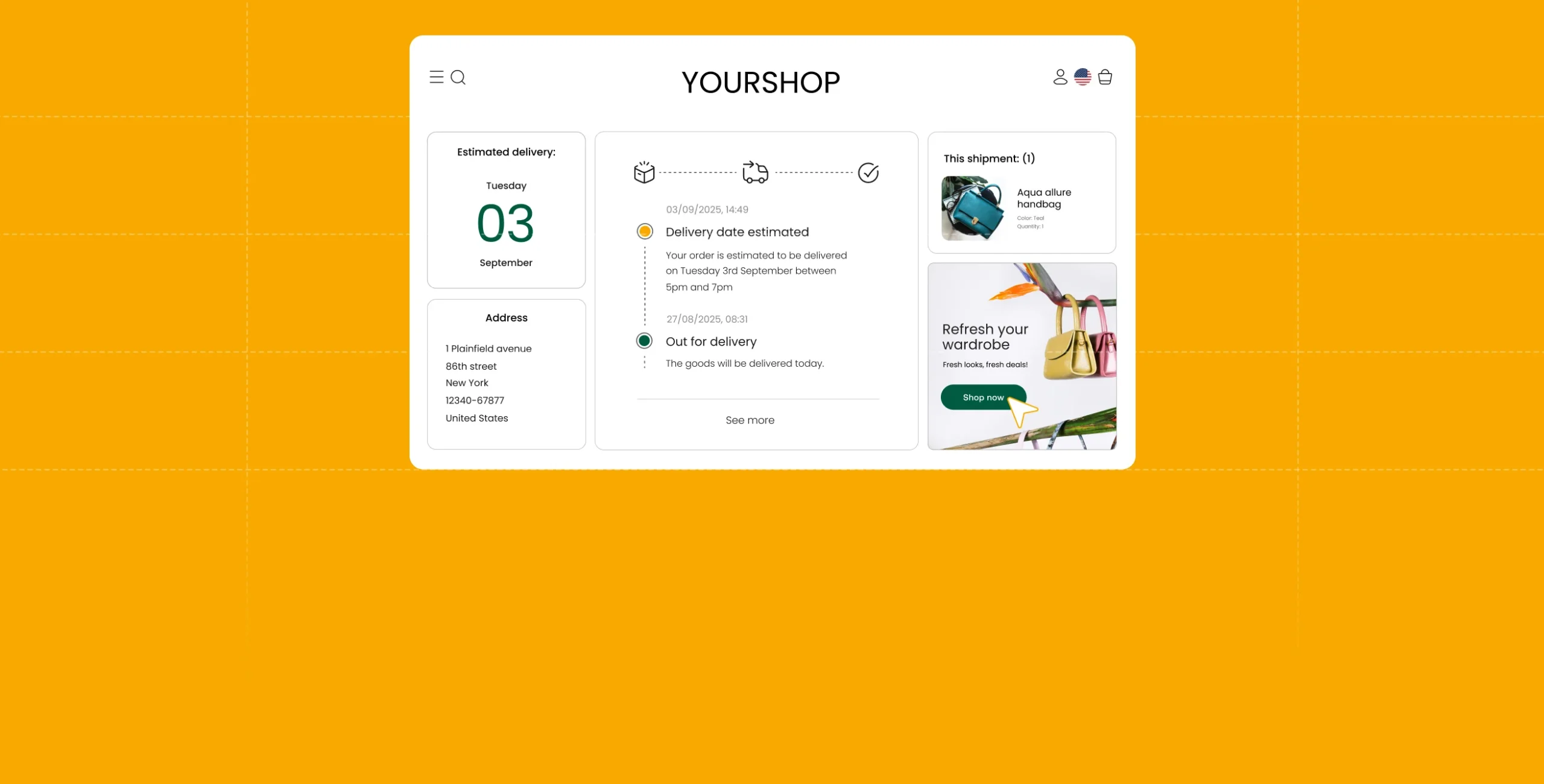Why parcelLab?
Discover why parcelLab is the go-to post-purchase partner for top retailers across the globe

Why parcelLab?
Discover why parcelLab is the go-to post-purchase partner for top retailers across the globe
Why parcelLab
Why top retailers choose parcelLab over the rest
AI and innovation
Transforming post-purchase with AI
PPX maturity curve
Discover where you stand on the curve
PPX Institute
Turn transactional relationships into customers for life
Post-purchase audit
Experience your brand the way your customers do
Platform
Platform support
PLATFORM
Meet the platform
The industry’s first and only PPX platform tailor-made for retailers
WHAT'S NEW
Benchmarking
Benchmark against the industry in real-time
Copilot
Turn delivery anxiety into customer satisfaction with AI
AI Email Editor
Streamline operations and reduce complexity with AI-powered automation
Campaign Manager 2.0
Run campaigns that drive revenue
Smart Survey
Collect feedback and drive improvements


OVERVIEW
Enhance delivery experience
Seize control of your delivery experience
CAPABILITIES
Track & communicate
Keep your customers engaged
Set up a branded tracking portal
Keep customers in your ecosystem
Create personalized journeys
Deliver the right message, at the right time
Run targeted campaigns
Create campaigns that convert
Predict delivery delays
See delivery issues before they happen and take proactive action
Streamline claims management
Reclaim time, revenue, and customer trust
Resolve customer inquiries
Empower your customer service teams

OVERVIEW
Make returns seamless
Transform customer dissatisfaction into revenue retention by digitizing returns and exchanges.
CAPABILITIES
Track and inform returns status
Create a seamless returns experience that retains customers
Self-service returns portal
Let customers register returns with ease
Personalize returns journey
Encourage exchanges over refunds
Forecast returns volume
Anticipate return patterns before they happen
Offer flexible returns
Give your customers versatile return options that cater to their preferences


OVERVIEW
AI-powered post-purchase
Optimize every post-purchase interaction with parcelLab's AI agents
CAPABILITIES
Execute with AI
Harness the power of AI agents
Predict with AI
Stay ahead with real-time insights & forecasts
Simplify with AI
Cut complexity & streamline operations
Personalize with AI
Deliver tailored experiences

Solutions
Reduce WISMO & WISMR calls
Keep customers in the loop & support smarter
Turn returns into revenue
Make returns seamless, maximize revenue
Manage complex post-purchase scenarios
Handle exceptions, claims & logistics
Optimize post-purchase campaigns
Boost engagement & drive conversions
Enhance personalization and engagement
Create 1:1 tailored experiences
Resources
Company

Why parcelLab?
Discover why parcelLab is the go-to post-purchase partner for top retailers across the globe
Why parcelLab
Why top retailers choose parcelLab over the rest
AI and innovation
Transforming post-purchase with AI
PPX maturity curve
Discover where you stand on the curve
PPX Institute
Turn transactional relationships into customers for life
Post-purchase audit
Experience your brand the way your customers do
PLATFORM
Meet the platform
The industry’s first and only PPX platform tailor-made for retailers
WHAT'S NEW
Benchmarking
Benchmark against the industry in real-time
Copilot
Turn delivery anxiety into customer satisfaction with AI
AI Email Editor
Streamline operations and reduce complexity with AI-powered automation
Campaign Manager 2.0
Run campaigns that drive revenue
Smart Survey
Collect feedback and drive improvements

OVERVIEW
Enhance delivery experience
Seize control of your delivery experience
CAPABILITIES
Track & communicate
Keep your customers engaged
Set up a branded tracking portal
Keep customers in your ecosystem
Create personalized journeys
Deliver the right message, at the right time
Run targeted campaigns
Create campaigns that convert
Predict delivery delays
See delivery issues before they happen and take proactive action
Streamline claims management
Reclaim time, revenue, and customer trust
Resolve customer inquiries
Empower your customer service teams

OVERVIEW
Make returns seamless
Transform customer dissatisfaction into revenue retention by digitizing returns and exchanges.
CAPABILITIES
Track and inform returns status
Create a seamless returns experience that retains customers
Self-service returns portal
Let customers register returns with ease
Personalize returns journey
Encourage exchanges over refunds
Forecast returns volume
Anticipate return patterns before they happen
Offer flexible returns
Give your customers versatile return options that cater to their preferences

OVERVIEW
AI-powered post-purchase
Optimize every post-purchase interaction with parcelLab's AI agents
CAPABILITIES
Execute with AI
Harness the power of AI agents
Predict with AI
Stay ahead with real-time insights & forecasts
Simplify with AI
Cut complexity & streamline operations
Personalize with AI
Deliver tailored experiences

Reduce WISMO & WISMR calls
Keep customers in the loop & support smarter
Turn returns into revenue
Make returns seamless, maximize revenue
Manage complex post-purchase scenarios
Handle exceptions, claims & logistics
Optimize post-purchase campaigns
Boost engagement & drive conversions
Enhance personalization and engagement
Create 1:1 tailored experiences
Resources
Company

Returns are no longer just a back-end process, they are a vital component of the customer journey that can make or break a retailer’s relationship with its customers. Our guide reveals how to justify and evaluate a returns experience management solution.
A brand’s returns policy isn’t just a policy—it’s a deciding factor in customer loyalty and profitability. The numbers reveal why an optimized returns experience is a must.
Nine out of ten shoppers are influenced by a brand’s returns policy
A third of revenue is lost from returns due to operational costs and missed sales
Two-thirds of shoppers are unlikely to shop again with a retailer that has a complex or difficult returns process
Returns don’t have to be a revenue drain. With the right approach, they can drive retention, increase operational efficiency, and even boost customer lifetime value.
Don’t let inefficiencies hold you back – take control with a robust, integrated returns experience management solution.
Selecting the right returns management solution is about more than just processing returns—it’s about creating a frictionless, data-driven experience.
Making the returns process seamless and giving the shopper an easy route to refund/exchange
Anticipating returns volume to ensure optimum resource allocation and reduce the processing speed
Processing returns quickly to issue timely refunds to shoppers
Delivering personalized follow-ups and product recommendations based on purchase history
Sharing return status updates timely and proactively to keep the shopper informed
An error has occurred, please try again later.An error has occurred, please try again later.
By submitting the form, you agree to receive marketing information according to our Privacy Policy. You can unsubscribe at any time.